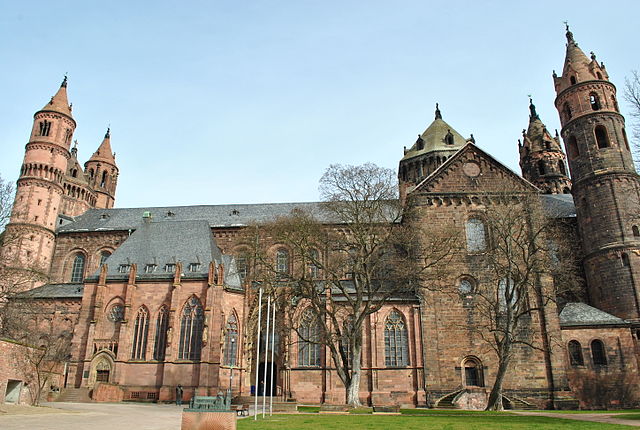The Prince-Bishopric of Worms was an ecclesiastical principality of the Holy Roman Empire. Located on both banks of the Rhine around Worms just north of the union of that river with the Neckar, it was largely surrounded by the Electorate of the Palatinate. Worms had been the seat of a bishop from Roman times. From the High Middle Ages on, the prince-bishops' secular jurisdiction no longer included the city of Worms, which was an Imperial Free City (the Free Imperial City of Worms) and which became officially Protestant during the Reformation. The prince-bishops however retained jurisdiction over the Cathedral of Worms inside the city.
Prince-Bishopric of Worms | |||||||||
|---|---|---|---|---|---|---|---|---|---|
| 861–1802 | |||||||||
 The Prince-Bishopric of Worms circa 1700 | |||||||||
| Status | Prince-Bishopric | ||||||||
| Capital | Worms until 1400; thereafter Ladenburg | ||||||||
| Common languages | Ripuarian Franconian | ||||||||
| Government | Prince-Bishopric | ||||||||
| Historical era | Middle Ages | ||||||||
• Bishopric founded | 614 | ||||||||
• Gained Reichsfreiheit | 861 | ||||||||
| 1795 | |||||||||
| 1802 | |||||||||
| |||||||||

In 1795 Worms itself, as well as the entire territory of the prince-bishopric on the left bank of the Rhine, was occupied and annexed by France. In the wake of the territorial reorganizations that came with the German mediatization of 1802, the remaining territory of the bishopric, along with that of nearly all the other ecclesiastical principalities, was secularized. In this case, it was annexed by Hesse-Darmstadt.
Bishops of Worms, 770—1802
|
|
|
References
External links
Wikiwand in your browser!
Seamless Wikipedia browsing. On steroids.
Every time you click a link to Wikipedia, Wiktionary or Wikiquote in your browser's search results, it will show the modern Wikiwand interface.
Wikiwand extension is a five stars, simple, with minimum permission required to keep your browsing private, safe and transparent.

